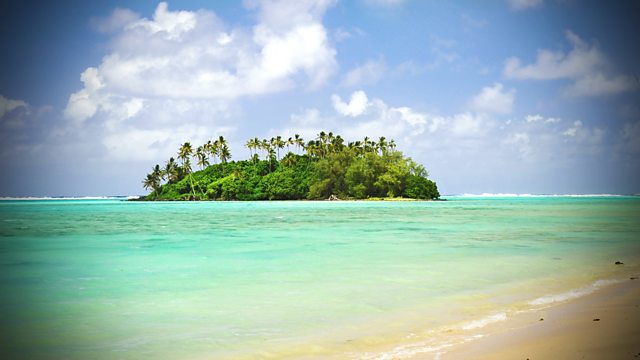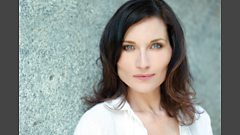
Islands
Kate Fleetwood and Dominic Mafham explore literary writings about islands from John Donne's famous Meditation No.17 to A. K. Ramanujam's take on the Donne, 'No Man is an Island', and Daniel Defoe to Derek Walcott. The music includes works by Rautavaara, Purcell and Otto Luening.
Last on
More episodes
Previous
Music Played
Timings (where shown) are from the start of the programme in hours and minutes
-
![]() 00:00
00:00Otto Luening
Low Speed
Performer: Otto Luening (electronics).- OHM CD3670.
- CD1 T6.
-
Robert Louis Stevenson
Fair Isle at Sea, read by Dominic Mafham
Gerald Manley Hopkins
There is an island, read by Kate Fleetwood
Claudian, translated by Howard Mumford Jones
The Lonely Isle, read by Kate Fleetwood
![]() 00:03
00:03Richard Rodney Bennett
Sea Change for chorus (Isle full of Noyses)
Performer: Cambridge Singers, John Rutter (director).- COLLEGIUM CSCD521.
- 1.
Shakespeare
The Tempest (extract, 3.2.135-142), read by Dominic Mafham
![]() 00:06
00:06Marin Marais
Plainte (Suite en sol)
Performer: Hille Perl (viola da gamba), Lee Santana (theorbo).- DHM 82876587912.
- 11.
![]() 00:09
00:09Bridge
Moonlight (The Sea)
Performer: Royal Liverpool Philharmonic Orchestra, Charles Groves (conductor).- EMI CDM 7 69870 2.
- 3.
Neruda
XVII: The Island, read by Kate Fleetwood
William Golding
Lord of the Flies (extract), read by Dominic Mafham
![]() 00:16
00:16Frédéric Chopin
Nocturne in B major Op.32 No.1
Performer: Maria Joao Pires (piano).- DG 447096-2.
- 9.
John Keats
Sonnet to Ailsa Craig, read by Kate Fleetwood
![]() 00:21
00:21Rautavaara
Isle of Bliss / Lintukoto
Performer: Helsinki Philharmonic Orchestra, Leif Segerstam (conductor).- ONDINE ODE 989-2.
- 13.
![]() 00:32
00:32Pierre Boulez
Memoriale (... explosante fixe... Originel)
Performer: Sophie Cherrier (flute), Soloists of Ensemble Intercontemporain, Pierre Boulez (conductor).- DG 480 6828.
- CD7 T13.
Lucretia Davidson
Sabrina. A Volcanic Island, Which Appeared Among the Azores, in 1811, read by Kate Fleetwood and Dominic Mafham
Seamus Heaney
The Disappearing Islands, read by Dominic Mafham
Vachel Lindsay
A Song in July, read by Kate Fleetwood
![]() 00:39
00:39Henry Purcell
Fairest Isle (King Arthur)
Performer: Veronique Gens (soprano), Les Arts Florissants, William Christie (director).- ERATO 4509985352.
- CD2 T10.
Robert Browning
The Isles Enchantress, read by Dominic Mafham
![]() 00:44
00:44Edgard Varèse
Density 21.5
Performer: Jacques Zoon (flute).- DECCA 460 208-2.
- CD2 T11.
Rin Ishigaki
Island, read by Kate Fleetwood
John Donne
Meditation 17 (extract), read Dominic Mafham
A. K. Ramunujam
No Man is an Island, read Kate Fleetwood
![]() 00:49
00:49Sergey Prokofiev
Scherzo humoristique, Op.12 No.9, arranged for 4 bassoons from 10 pieces, Op.12
Performer: Martin Gatt, Meyrick Alexander, Melbon Mackie, John Orford (bassoons).- CONIFER CDCF173.
- 13.
Hilda Conkling
The Lonesome Wave, read Kate Fleetwood
![]() 00:52
00:52Claude Debussy
Lisle joyeuse
Performer: Jean-Efflam Bavouzet (piano).- CHANDOS CHAN 10443.
- 14.
Derek Walcott
Islands, read by Dominic Mafham
![]() 00:58
00:58György Ligeti
Aventures (extract)
Performer: Jane Manning (soprano), Mary Thomas (mezzo soprano), William Pearson (bass), Ensemble Intercontemporain, Pierre Boulez (director).- DG 423244-2.
- 11.
Li Po, translated by Florence Ayscough
Parrot Island, read Kate Fleetwood
Daniel Defoe
Robinson Crusoe (extract from Chapter 4), read by Dominic Mafham
![]() 01:02
01:02Anon / Leonhard Schmidinger (instrumental music)
Ssequentia: Victimae paschali laudes
Performer: Martin Grubinger & Leonhard Schmidinger (percussion), Schola Cantorum of the Benedictine Abbey Münsterschwarzach, Godehard Joppich (director).- DG 4778797.
- 8.
Anonymous, translated by Michael Alexander
Wulf and Eadwacer, read by Dominic Mafham
![]() 01:05
01:05Gabriel Prokofiev
Spheres
Performer: Daniel Hope (violin), Deutsches Kammerorchester Berlin, Simon Halsey (conductor).- DG 479 0571.
- 9.
Sam Taylor
The Island at the End of the World (opening extract), read by Kate Fleetwood
Longfellow
Ultima Thule, read by Dominic Mafham
![]() 01:09
01:09Sibelius
Chorus of Winds (The Tempest, Suite No. 2)
Performer: Scottish Chamber Orchestra, Joseph Swensen (conductor).- LINN CKD 220.
- 15.
Andrew Young
Islands, read by Dominic Mafham
C. P. Cavafy, translated by Edmund Keeley and Philip Sherrard
Ithaka, read by Kate Fleetwood
George Barlow
My Island, read by Kate Fleetwood
Producer's Note - Islands
Be not afeard.�� The isle is full of noises,
Sounds and sweet airs that give delight and hurt not.
��
(Shakespeare: The Tempest)
��
There is an extraordinary wealth of literary writings about islands, from Shakespeare’s Tempest to Defoe’s Robinson Crusoe, and John Donne’s Meditation 17 to A. K. Ramanujan’s take on Donne’s famous words, ‘no man is an island’.�� Islands offer a scenic and romantic setting for escape or contemplation, and they are also clearly-delineated places on which a drama can unfold.
��
This edition of Words and Music explores literary islands in their different guises and meanings.�� The programme beings with the names of fictional islands being layered over Otto Luening’s ground-breaking early tape composition, Low Speed, to create an ethereal seascape as we approach the first�� islands: Robert Louis Stevenson’s ‘Fair Isle at Sea’ and Claudian’s The Lonely Isle.�� Otto Luening’s Low Speed segues seamlessly into Richard Rodney Bennett’s Sea Change for Chorus, which sets Shakespeare’s famous words about the isle ‘full of noyses’ from The Tempest.�� Shakespeare’s Tempest takes place entirely on an island and its surrounding sea, and is iconic in the early literature of islands.�� The ‘pillars of light mournful and beautiful’ that open Neruda’s poem, The Island, match Caliban’s words, ‘I cried to dream again’, from the Shakespeare.�� I chose to set the Shakespeare and Neruda over a Plainte by Marin Marais paired with Bridge’s Moonlight as they capture the melancholic beauty and wonderment of the words.������
��
Some of the most popular novels of all time take place on islands and this programme next visits Ralph and Piggy as it dawns on them that they have arrived on an island in William Golding’s Lord of the Flies.�� Later in the programme, Daniel Defoe’s solitary figure, Robinson Crusoe, is also newly arrived on a desert island and sets about orientating himself to find a proper place for his habitation there.��
��
Islands are born from volcanic explosions from deep on the sea bed and sometimes they disappear again.�� John Keats’ Sonnet to Ailsa Craig is a wonderful homage to the tectonic origins of the island: ‘Drown’d wast thou till an earthquake made thee steep, Another cannot wake thy giant size!’, while Lucretia Davidson’s poem Sabrina tells the tale of a volcanic island which appeared and then disappeared among the Azores in 1811.�� I have set Davidson’s poem to the explosive sounds of Boulez’s Memoriale (... explosante fixe... Originel).�� The programme also includes poems by Seamus Heaney and Vachel Lindsay on disappearing islands and Atlantis respectively.
��
Perhaps one of the most famous literary references to islands is found in John Donne’s Meditation 17 and in the words, ‘no man is an island’.�� I explore the idea of man as an island first in the words of Rin Ishigaki, whose poem Island portrays a solitary figure looking at himself as ‘a dot, a small island’ standing in a mirror.�� The solitary sounds of a single flute in Varese’s Destiny 21.5 counterpoint Ishigaki’s words, and then John Donne’s Meditation 17 is paired with A.K. Ramunujam’s poetic take on the Donne, No Man is an Island, in which the difficulties of living in isolation are expressed.�� There is a slightly comical end to the Ramanujam poem, which is echoed in Prokofiev’s quirky Scherzo humoristique for four bassoons.
��
Islands are places for love and Hilda Conkling’s The Lonesome Wave ends joyfully as golden waves fling themselves on the beach, leading into Debussy’s L’isle joyeuse.�� Derek Walcott claims in his poem Islands that ‘islands can only exist if we have loved in them’.��
��
Robinson Crusoe is the most famous inhabitant of a deserted island, but Li Po also wrote about the solitude felt by an official banished on Parrot Island as the parrots flew west to Dragon Mountain.�� The parrots are illustrated by the ambiguous sounds in Ligeti’s Aventures.�� The ancient English tale, or riddle, of Wulf and Eadwacer also places the speaker on an island separated from his lover and is characterized by the earthy sounds of Martin Grubinger and Leonhard Schmidinger playing a percussion descant to the chanting of Schola Cantorum of the Benedictine Abbey Münsterschwarzach.��
��
Mythical islands have also captured the imagination of writers, including Longfellow who sails for the Hesperides, tempest-haunted Orcades and then to the safe harbours of ‘Ultima Thule’.�� C. P. Cavafy’s poem Ithaka encourages us to make the most of the journey there for the purpose of Ithaka is entirely in making that journey.�� The programme concludes with a musical reference to Shakespeare’s Tempest in music from Sibelius’s incidental music for The Tempest.��
��
Elizabeth Arno (producer)
��
Broadcast
- Sun 1 Nov 2015 17:30����ý Radio 3
The hidden history of plant-based diets
Books website
Get closer to books with in-depth articles, quizzes and our picks from radio & TV.
Gallery



